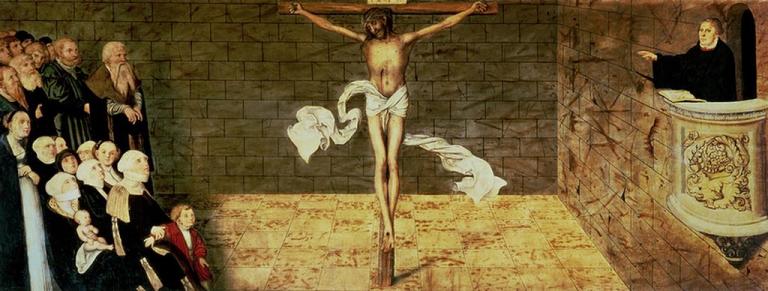Another non-Lutheran fan of Luther vs. conservatives who blame him for modern subjectivism. . . .
A Reformed theologian defends Luther in mostly-Catholic First Things. It’s a post by Carl Trueman–not such a surprise, since he is an accomplished Luther scholar–entitled Blame It on Luther?
He is discussing an article by Casey Chalk entitled The Autonomous Self is a Coercive God at the conservative site Public Discourse. Prof. Trueman agrees with his main point:
Yet I dissent from Chalk’s genealogy of modernity. He goes on to argue that this notion of the autonomous, emotivist self can be traced to Martin Luther. In part this is because Chalk depends upon Jacques Maritain’s Three Reformers: Luther, Descartes, Rousseau for his reading of Luther. Luther is simply not the great apostle of subjectivism that Maritain claims he is. It may well be that subjectivism is where the Protestant Reformation led, but it was certainly neither Luther’s intention nor his own stated position. The debate with Zwingli over the reality of Christ’s presence in the Eucharist is the most obvious example of his concern for objective truth detached from the individual’s own beliefs, though one might also point to his notion of conscience as formed by the Word of God in the context of the Christian life, not as some principle of autonomous personal judgment. Whether Luther’s positions on these issues proved stable in the long run is a matter for debate. The point is that he was wrestling with how to balance objective truth and personal commitment (an issue found throughout the New Testament). He was not arguing for human beings as isolated, atomized human beings.
Indeed. Chalk says this (my bolds):
Luther expounds a theology that seeks to assure the Christian of the certainty of his salvation, based on the former Augustinian monk’s interpretation of several key Pauline passages. For this, Luther necessarily must shift the locus of metaphysical certitude in one’s spiritual well-being away from external, objective criteria like the sacraments toward subjective ones, namely, the autonomous self reading the Bible.
Does any Lutheran–that is, someone who is part of a church body in which Luther’s theology is regularly taught and lived through–believe this, or even recognize it as coming from their church? That we should look for our spiritual well-being “away from external, objective criteria like the sacraments toward subjective ones”? Isn’t it rather the opposite? Aren’t we always being told not to focus on our subjective feelings and to look instead at “objective criteria like the sacraments” for the assurance of our salvation? Have you ever heard the recommendation of “the autonomous self reading the Bible”? We read the Bible–with the help of our pastors, the Book of Concord, and the glosses of the Lutheran Study Bible and such like looking over our shoulders–not autonomously, as in we can interpret it any way we want, but as one of those “objective criteria” that we can hold on to, over against our selves.
The thing is, this kind of utter ignorance about Luther and the penchant for blaming him for subjectivism and for all the other pathologies of modernity can be found over and over again, especially in conservative cultural critiques. That is to say, in conservative cultural critiques written by Roman Catholics, particularly the “integralists,” who call for a return to the temporal authority of the papacy over secular politics and who are playing a prominent role in the new varieties of conservativism that are critical of liberty, free-market, and Constitutional conservatism.
I understand why they would need to discredit Luther, who strenuously attacked the Pope’s claim to temporal authority–arguing that secular rulers themselves have an authority from God, by virtue of their vocation, and that the Church is not about worldly power but about the Kingdom of Heaven–but they shouldn’t make him a straw man for what they don’t like about radical Protestants, whom Luther opposed with all his might, let alone “subjectivism” or “modernity” or “the autonomous self.”
Prof. Trueman goes on to show that the mindset that Chalk and Mauritain complain about has roots in the Middle Ages and the Medieval church long before Luther. The fact is, Prof. Trueman has written an excellent book on the actual history of the autonomous self, which needs to be read by anyone interested in the matter, whether Catholic or Protestant, liberal or conservative, or whatever kind of conservative you are: The Rise and Triumph of the Modern Self: Cultural Amnesia, Expressive Individualism, and the Road to Sexual Revolution.
Illustration: Altarpiece, St. Mary’s church, Wittenberg, by Lucas Cranach the Younger and workshop, Public domain, via Wikimedia Commons














